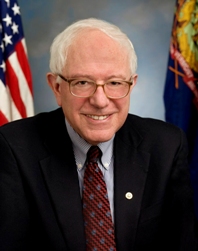Sanders Notches 2nd Biggest Democratic New Hampshire Primary Win in History
Only John Kennedy’s victory against the “Space Pen” inventor in 1960 was larger among the 13 contested Democratic primaries in the Granite State

On the Democratic side, Bernie Sanders ran up the score over Hillary Clinton by a margin that had only been seen once before in a contested primary – and only then in a race with just one established politician.
A Smart Politics analysis finds that Sanders’ 22.4-point victory over Clinton marked the second largest victory margin in a contested Democratic New Hampshire primary – behind only John Kennedy’s 1960 win over pen inventor and political novice Paul Fisher.
Sanders swept all 10 counties in the state on Tuesday and recorded 60.4 percent of the vote – more than 22 points ahead of Clinton’s 38 percent.
The only other candidate who recorded a more decisive victory for the party in the state was Senator Kennedy in 1960 when he won 85.2 percent of the vote against pen company executive Paul Fisher – a margin of 71.7 points.
Each of the other 11 contested Democratic primaries in New Hampshire were more competitive than Sanders’ blow-out win over Clinton with an average victory margin of just 8.5 points:
- 1952 (10.7 points): Estes Kefauver over Harry Truman
- 1968 (7.7 points): Lyndon Johnson over Eugene McCarthy
- 1972 (9.2 points): Ed Muskie over George McGovern
- 1976 (5.7 points): Jimmy Carter over Mo Udall
- 1980 (9.8 points): Jimmy Carter over Ted Kennedy
- 1984 (9.4 points): Gary Hart over Walter Mondale
- 1988 (16.0 points): Michael Dukakis over Dick Gephardt
- 1992 (8.4 points): Paul Tsongas over Bill Clinton
- 2000 (4.1 points): Al Gore over Bill Bradley
- 2004 (12.1 points): John Kerry over Howard Dean
- 2008 (2.6 points): Hillary Clinton over Barack Obama
The 11 cycles above include three races, just like in 2016, with only two bona fide candidates in the race: Kefauver vs. Truman in 1952, Johnson (as a write-in) vs. McCarthy in 1968, and Gore vs. Bradley in 2000.
Kefauver (1956), Johnson (1964), Clinton (1996), and Obama (2012) all ran uncontested (aside from fringe or write-in candidates) during their other victories in the state.
The 1952 cycle marked the first presidential primary in the state in which candidate voter preference options appeared on the ballot after the passage of a 1949 state law.
Prior to 1952, delegate slates were either unpledged or unanimously backed a Democratic candidate (Woodrow Wilson in 1916, Al Smith in 1928, Franklin Roosevelt in 1932, 1936, 1940, and 1944, and Harry Truman in 1948).
Follow Smart Politics on Twitter.

EL PUEBLO SE CANSO DE TANTAS MENTIRAS , DE TANTA CORRUPCION QUE LOS POLITICOS SE VENDEN A LAS GRANDES CORPORACIONES , A LOS MILLONARIOS Y NO HACEN NADA A FAVOR DE LA CLASE TRABAJADORA, ENGAÑAN A LOS VOTANTES CON TANTO OFRECIMIENTO, DICEN QUE LUCHAN POR LA LIBERTAD DE LOS AMERICANOS, ESE ES EL MAYOR Y DESCARADO ENGAÑO, LA LIBERTAD QUE SE TIENE EN ESTE PAIS , NUNCA ESTA EN PELIGR.LOS CIUDADANOS QUEREMOS NUEVAS CARAS EN EL RUEDO POLITICO, CON IDEAS NUEVAS A FAVOR DE LAS MAYORIAS, Y EL UNICO QUE REFLEJA SERIEDAD Y CONFIANZA DE LOS DOS PARTIDOS ES EL SENADOR BERNIE SANDERS POR EL CUAL TRABAJARE Y HARE TODO LO QUE PUEDA HASTA LOGRAR SU TRIUNFO, ESE SERA EL PROXIMO PRESIDENTE QUE RENOVARA LAS ESPERANZAS DEL PUEBLO AMERICANO.